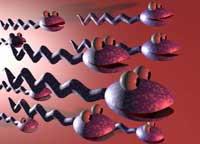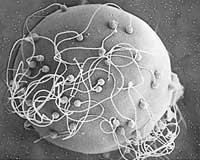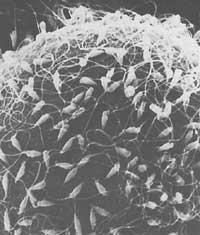The future of the human species in doubt
2002/08/25 Mendiburu, Joana - Elhuyar Zientziaren Komunikazioa

Throughout history, the woman has been accused of not being able to have children. However, since World War II, male sterility has equalled female sterility and it seems that men produce less and less sperm and worse quality.
The quality of the sperm is measured in number and mobility. A healthy man produces between 100 and 200 million sperm per day. In other words, it is estimated that for each heartbeat 1,500 new sperm are generated. Sperm are produced by testicles and, in fact, sperm represent between 5-10% of the mass of the testicles, a mass that is renewed daily.
The sperm is not born spontaneously. That is, it does not arise directly from a cell that resembles it. The process, like most of the remaining cells, begins with circular stem cells.

Stem cells are divided and at each stage of division the cell population increases until, at any given time, cells are divided into two consecutive divisions. From these two successive divisions the spermatida is formed. The expected ones do not have the capacity of reproduction, but they do change of form by metamorphosis. The cell nucleus is compact and the cell adopts such a known elongated shape. Thus is formed the mud, the scourge, which will give movement to the sperm. Sperm is the only cell with a propellant device.
This would be, if the external factors did not influence, the production of sperm of all men. However, more and more studies have shown that in the last twenty-five years the production of sperm has decreased and anomalies are increasing.
Decrease in the quality of sperm
In 1992, the British Medical Journal published the first research on the decrease in sperm production by men. The author of the article was the andrologist Niels Skakkebaek, currently of great prestige. Three years later, in 1995, researcher Jacques Anges, who works at the CECOS laboratory in Paris, released a second research on the same line in the New England magazine. His team, between 1973-1992, studied in the laboratory the sperm of 1,300 men and concluded that year after year the concentration of sperm is reduced by 2%.

But male fertility not only depends on the number of sperm, but also on mobility. For this reason, it is worrying the abundance of spermatozoa with two scourges or that perform rare and unbalanced movements. Also appear the rounded heads and this atypical form is not compatible with the oculus.
The andrologists agree that the quality of the sperm is worsening. However, research is still not fully demonstrated the reason for this.
Why so many anomalies?

Pollution, food, chemicals, drugs… are topics that could affect sperm, but still few studies have shown that this product or another is harmful. However, the andrologists are working and are starting to collect the results of the work of the years. Proof of this are the results of several studies that were released at the meeting held in Vienna in early July.
The CECOS Paris laboratory, for example, has been investigating the possible influence of glycol ether. Glycol ether is a component of 6,000 products of butter, cream, detergent, soap, shampoos, paint... which is inserted into the body by inhalation or by skin. Research has shown that it has interrupted development in the early stages of sperm creation. In France, in 1999, 4 of the 30 ether glicoles of domestic use were banned, but in the industry all are still used. As calculated, in France, a million people could be affected by these products.

For its part, a team of researchers from the King School of London has shown that the chemical hormones of food and pesticides affect the sperm quality of adults. It seems that these hormones mature faster than natural ones, but reproduction costs them a lot.
A French research group attempts to demonstrate that man's stance may be related not only to external factors, but also throughout the day. The temperature of the testes is less than 37ºC, but it is believed that if all day is sitting, the temperature increases and the sperm production decreases. For this reason, he advises men who work sitting on a sporadic walk, although the work done so far has not confirmed these suspicions.
Published in 7K.

Gai honi buruzko eduki gehiago
Elhuyarrek garatutako teknologia






